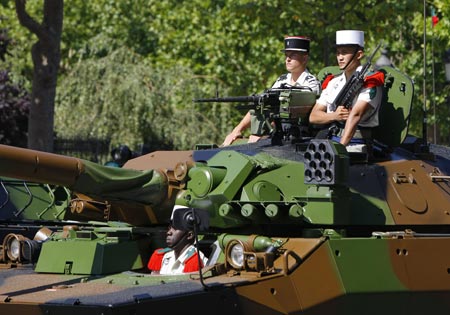Police were Tuesday out in force to deal with any incidents on France's Bastille Day national holiday, as hundreds of thousands gathered in Paris to hear rock idol Johnny Hallyday.

|
|
French soldiers take part in the National Day parade in Paris, France, July 14, 2009. France celebrated its National Day on Tuesday. [Xinhua]
|
Earlier in the day, 210,000 people turned out to watch the traditional military parade down the Champs Elysees in Paris, which this year was led off by a detachment of Indian troops.
Four hundred Indian soldiers marched down the Champs Elysees under the eyes of Indian Prime Minister Manmohan Singh, invited as guest of honour by President Nicolas Sarkozy.
Dressed in ceremonial uniforms of red and black headdress, cummerbunds and white puttees and gloves, the Indians marched from the Arc de Triomphe to the presidential stand at the end of the 1.5-kilometre (one mile) parade.
French air force jets flew overhead, releasing trails of red, white and blue smoke to represent the colours of the French flag, and the parade came to a close with parachutists floating down on to the Place des Invalides.
Singh and Sarkozy were joined in the presidential stand by the French president's singer wife Carla Bruni, Cambodian Prime Minister Hun Sen, German President Horst Koehler and other dignitaries.
Later, Sarkozy hosted the traditional garden party at the presidential Elysee palace.
He said that "in 20 or 30 years India will be the most populated country in the world, it is a friend of France."
Singh for his part paid tribute to France, saying that "in our own country our freedom struggle was immensely inspired by the French ideals of liberty, equality and fraternity."
France is one of the key arms suppliers for India's technology-hungry military, and is negotiating to supply technology to India's civilian nuclear programme.
Among the French soldiers marching in the Bastille Day parade, units who have recently returned from operations abroad -- in places like Afghanistan, Kosovo and Lebanon -- were given prominent positions.
The Bastille Day march is held each year on July 14, the anniversary of the storming of the Bastille fortress in Paris by revolutionaries in 1789, the symbolic starting point of the movement that led to the first French republic.
At Paris' Champ-de-Mars meanwhile, next to the Eiffel Tower, police said a record 700,000 fans gathered to hear a free concert by rock singer Johnny Hallyday, who has become something of an institution in France.
His performance was due to be followed by a fireworks display to mark the 120th anniversary of the Eiffel Tower: the city of Paris has laid on 15,000 rockets to make sure the event goes off with a bang.
At least 40,000 French police and paramilitary gendarmes were on duty across France during the day, with a record 10,000 officers on the streets of Paris alone.
From late Monday to Tuesday, police had arrested 240 people, nearly twice last year's figures, detaining 190 compared with 72 over the same period in 2008.
Police reported that 317 cars had been burned this year, only slightly up on last year's figures.
Bastille Day has become an occasion for disaffected youths from bleak suburban housing projects to express their frustration with high unemployment rates and what they see as France's failure to integrate ethnic minorities.
The national holiday also sees fire stations across the country opening their doors to host dances that are open to everyone.